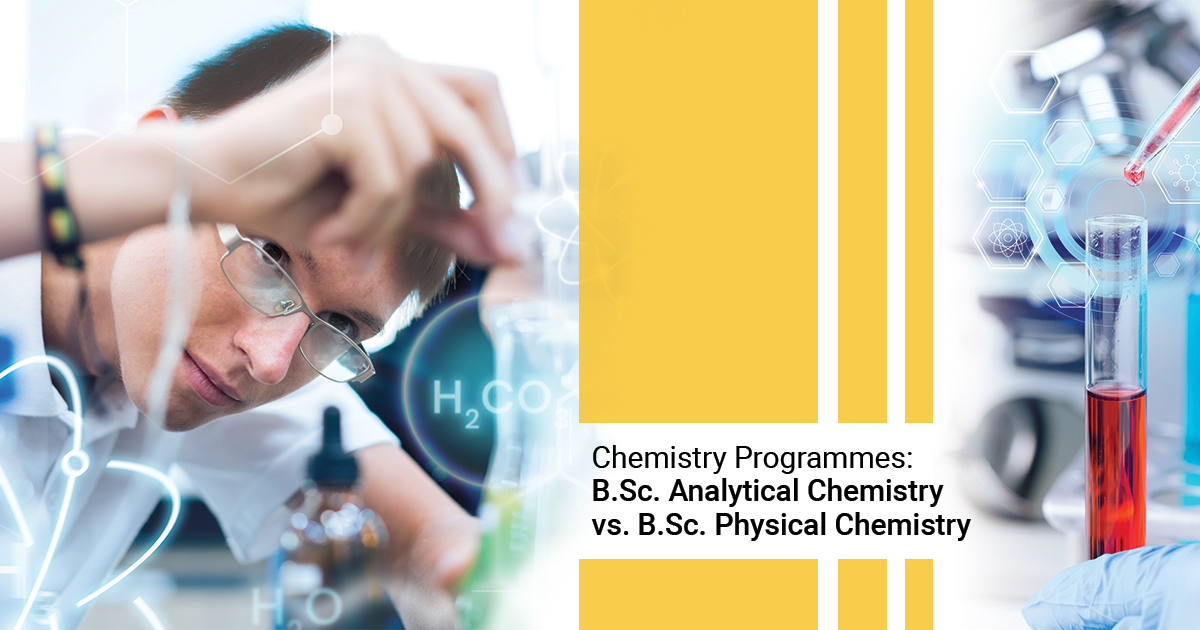Blog Detail


Chemistry Programmes: B.Sc. Analytical Chemistry vs. B.Sc. Physical Chemistry
11-11-2024

Analytical chemistry is concerned with developing and experimenting with techniques to analyse the composition and properties of various substances. The field of Analytical Chemistry plays a pivotal role in environmental monitoring, quality control, research and development across industries, and more.
Physical Chemistry explores the field of kinetic energy, thermodynamics, quantum mechanics, molecular structure, atom energy excitations and so on. Physical Chemistry forms the basis of material science, biophysics, and nanotechnology. Physical chemistry students are exposed to practical learning by working on theoretical models and computational simulations to understand and study the behaviour of chemically complex systems.
B.Sc Analytical Chemistry Vs B.Sc Physical Chemistry: Course Duration and Eligibility
Both the courses of B.Sc Analytical Chemistry and B.Sc Physical Chemistry have been designed for 3 years (6 semesters). These three years are inclusive of their internship tenure and major project along with theoretical and practical subject coaching and assessments.
Eligibility criteria for B.Sc Analytical Chemistry:
12th Grade Science Stream or equivalent studies completed with a percentage falling under the cut-offs as listed by the University.
Eligibility criteria for B.Sc Physical Chemistry:
12th Grade ScienceStream or equivalent studies completed with a percentage falling under the cut-offs as listed by the University.
B.Sc Analytical Chemistry Vs B.Sc Physical Chemistry: Course Curriculum
Listed below are the major subjects of the respective branches:
Analytical Chemistry:
● Forensic science
● Stereochemistry of Organic Reactions
● Physical Methods in Inorganic Chemistry and Main Group Chemistry
● Introduction to Biomolecules, Biosensors, and Analysis of Clinical and Consumer Products
● Modern Analytical Techniques
● Industrial Products and Forensic Analysis
Physical Chemistry
● Chemical thermodynamics
● Chemical kinetics
● Statistical mechanics
● Quantum chemistry
● Electrochemistry
● Photochemistry
● Surface chemistry
● Solid-state chemistry
B.Sc Analytical Chemistry Vs B.Sc Physical Chemistry: Career Opportunities
Analytical Chemistry and Physical Chemistry are affiliated with multiple career options and below listed are some options to consider.
Career possibilities after Pursuing Analytical Chemistry
● Analytical Chemists: They assess the compound mixture by collectively using the knowledge of chemistry, statistics, and computational knowledge
● Environmental Chemist: Assesses the long-term risks and problems associated with soil and groundwater and its ecological impact
● Quality Control Specialist: Oversees and tests the quality of the formulated medicines and analyses the merits and demerits
● Pharmaceutical Analyst: Involves in analysing and researching more about the medicinal benefits and composition of substances
Career Possibilities after Pursuing Physical Chemistry
● Research Scientist: Engages in carrying out various scientific research after collecting data to formulate results
● Academician: Involves in researching, teaching, and guiding students with research projects and dissertations
● Computational Chemist: Works with advanced software technologies to run simulations to solve complex chemical problems
● Materials Scientist: Involves in studying the properties of materials and their composition to develop new products with accelerated efficiency
● Pharmaceutical Researcher: Involves in discovering, developing, and formulating new medicines
In Short
Analytical Chemistry and Physical Chemistry are two prominent sub-fields in Chemistry. These sub-disciplines of Chemistry are an integral part of today’s scientific and industrial world. Analytical Chemistry and Physical Chemistry offer diverse career paths with ample amount of opportunities. However, it is very important to make sure that subjects are chosen after identifying your area of interest and prospective career goals for the ease and interest of learning.